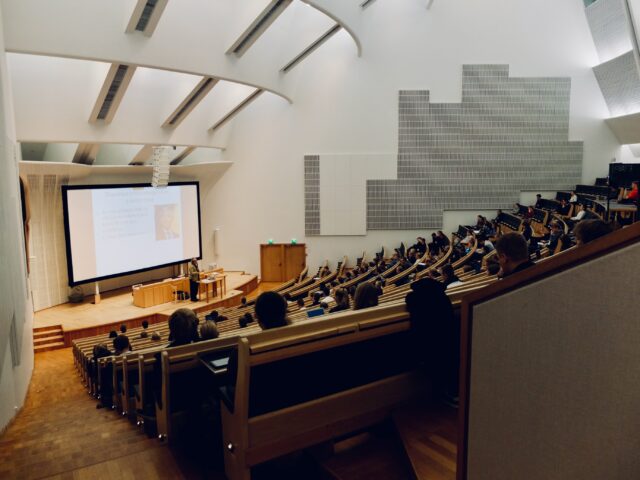Maclean’s has unveiled its University Rankings for 2024, which evaluates Canadian universities based on their performance in five areas: students, faculty, resources, student support, and reputation. Rankings are divided into three lists—Primarily Undergraduate universities, Comprehensive universities, and Medical Doctoral universities—which are determined by a university’s size and specialty. The top five universities in the Primarily Undergraduate category in order were Mount Allison University, University of Northern British Columbia, Saint Mary’s University, Bishop’s University, and Acadia University. The most highly ranked Comprehensive universities in order were Simon Fraser University, University of Victoria, University of Waterloo, York University, and Carleton University. The top five institutions for Medical Doctoral universities in order were McGill University, University of Toronto, University of British Columbia, McMaster University, and University of Ottawa.

Top Ten News
October 13, 2023
Collège de Rosemont chemistry instructor Alexandre Leroux created a game called “Classes & Dragons,” a reference to the Dungeons & Dragons tabletop game, to improve participation and engagement in class. Leroux explained that he was inspired to have students “play” the course, in an effort to combat low student motivation. In the class, students create an avatar that accumulates experience points through tasks such as attending classes and taking part in special assignments; and loses health points for behaviour such as forgetting materials or having their phone go off during class. As students accumulate experience points, they attain new “levels” in the game and earn rewards such as an assignment extension and are often motivated to maintain their higher level. Leroux’s game design is outlined on educative’s website.
Providence University College has acquired a property in downtown Winnipeg, which will enable the institution to expand its downtown campus and meet the needs of its growing student body. The top floors of the building will be used as an affordable housing option geared toward international students, while the rest of the building will be renovated to create classrooms, office spaces, student lounges, a cafeteria, and a chapel. The building has been acquired from Booth University College, and will be leased back to Booth for a year to give it time to relocate. “We are excited to see Providence return to the city of Winnipeg where it all started 98 years ago,” says Providence President Kenton Anderson. “Our new 87,000 square foot downtown campus will serve as a tremendous complement to our longstanding home base in Otterburne.”
The Université du Québec en Outaouais has launched a new multidisciplinary research centre that will shine a light on the relationship between cybersecurity, individuals, and society. The Centre de recherche et d’innovation en cybersécurité et société (CRICS) brings together academics from across departments to develop expertise and research on the human and organizational challenges of cybersecurity. CRICS–which will be headed by UQO Professor Patrice Renaud–was made possible thanks to a $2.5M grant from the Fonds de recherche du Québec. UQO rectrice Murielle Laberge expressed that this new centre will play a vital role in strengthening the capacities of individuals and organizations to benefit from society’s growing digitization.
Sheridan College has received a nearly $1.6M investment from the Government of Canada to strengthen its EDGE programming. EDGE is a social venture accelerator that provides entrepreneurs with a collaborative space so that they can start and scale up their businesses with resources and tools such as mentorship, networking, skills development, and access to financing. The investment will support EDGE in accelerating growth for entrepreneurs who are creating solutions for social, cultural, and environmental issues, and will support entrepreneurs who are from underrepresented groups. Sheridan says that the project will support 200 businesses and 150 new products and services.
The University of Saskatchewan’s College of Agriculture and Bioresources has announced a new admission pathway within its Kanawayihetaytan Askiy (meaning “let us take care of the land” in Cree) program. Originally, students who wanted to enroll in either the Indigenous Land Governance or Indigenous Resource Management diploma programs had to complete the Kanawayihetaytan Askiy certificate first. The change means that students can enter these diploma programs directly from high school. “By expanding our admission options, we are strengthening and diversifying our student community,” said USask Associate Professor Dr Melissa Arcand. “The Kanawayihetaytan Askiy program provides hands-on learning opportunities and skills that students can use to lead in their communities and across the country.”
A new report published by the Higher Education Quality Council of Ontario (HEQCO) examines the relationship between high school math achievement and postsecondary pathways. Researchers Jackie Pichette, David Kanters and Sofia Ahmed drew on data from the Hamilton Community Research Partnership and found that students with stronger math achievement were more likely than their counterparts to graduate high school, access postsecondary education, enroll in STEM programs, earn higher grades, and ultimately graduate from PSE. The authors conclude by noting that while indicators such as grades and standardized tests are imperfect and not a means to an end on their own, they are still important tools when combined with other indicators to provide information about students’ knowledge and skill development.
College of the North Atlantic and Academy Canada have signed an articulation agreement that will provide Early Childhood Education (ECE) students with an additional pathway. Graduates from Academy Canada’s two-year ECE program will have direct-entry acceptance into CNA’s one-year Advanced Diploma in ECE Administrative Leadership, which is offered online. Those who complete the Advanced Diploma will subsequently be able to apply directly to the fourth year of CNA’s Bachelor of Applied Arts in Early Childhood Education, which is held in an online-asynchronous format. The partnership will enable students to advance their careers and will address the labour shortage in the ECE sector.
To improve faculty retention, AnnaMaria Bliven (Western Governors University) recommends implementing student recognition or awards programs. Bliven discusses recent research on how a student recognition program implemented in an online, competency-based postsecondary program significantly impacted faculty satisfaction, which had a positive relationship with faculty retention. Over half of the students who were nominated for an Excellence Award through the recognition program wrote thank-you notes to the course instructor, program mentor, and evaluator who nominated them for the award. Faculty and staff were often elated to know they had made a difference and became more motivated and connected to their role at the institution. Bliven concludes that these programs can help institutional staff take pride in the overall impact they have made on their students.
Lambton College recently celebrated the opening of a new applied research lab, which is located at the Western Sarnia-Lambton Research Park. The Canadian Research Extrusion Lab aims to expand research projects and collaborations with companies in the plastics, rubber, and other materials industries. The lab will also aim to offer students more paid research opportunities to help them gain more experience for their future careers. Lambton Senior VP of Research and Innovation Mehdi Sheikhzadeh explained that facilities for the lab will be added in phases, with all new equipment expected to be in place by next summer. The creation of this $3.4M lab was made possible through funding from the Canadian Foundation for Innovation and the Ontario Research Fund.
